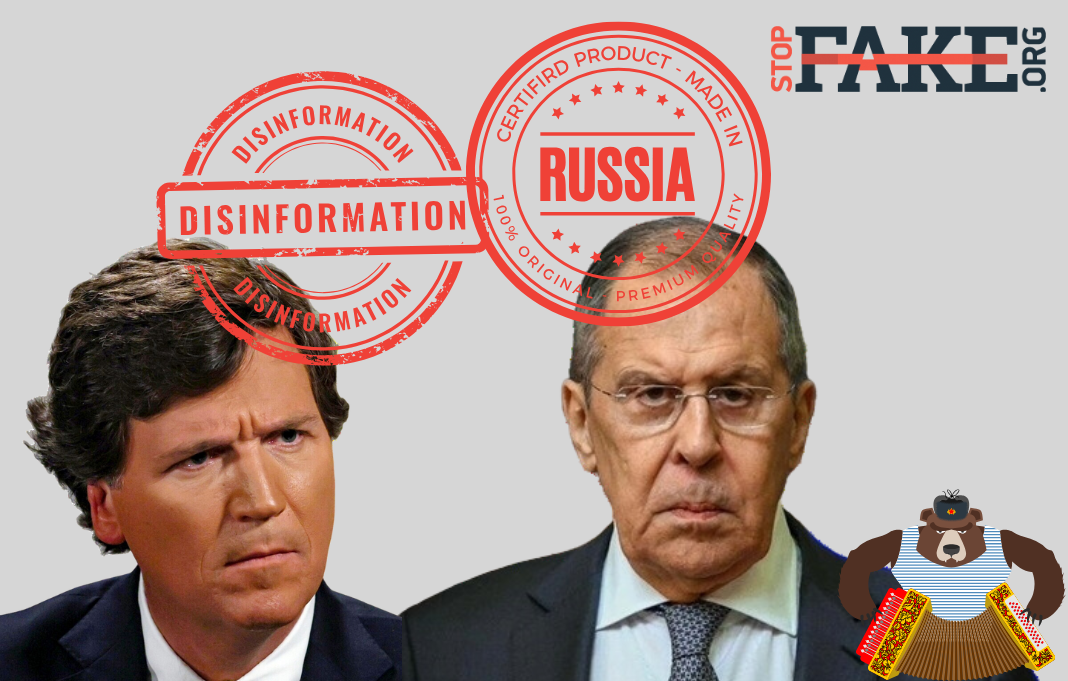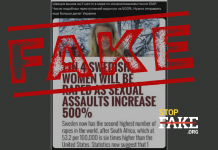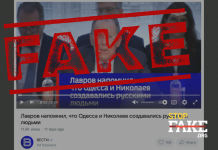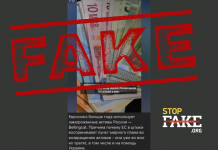American former TV host Tucker Carlson has come to Russia again — to interview Russian Foreign Minister Sergey Lavrov. Carlson claims that his mission is «to search for the truth». Yet if he was transparent, he would say that his goal is to provide a platform for the Kremlin’s disinformation right before Donald Trump’s inauguration.
StopFake already wrote about Carlson’s previous visit to Moscow, when a two-hour interview with Putin aired, most of which consisted of the Russian leader’s «pseudo-historical» monologue about who and how «invented Ukraine». This time, Tucker Carlson is no longer talking to Putin, but to «diplomat» Lavrov — after all, «the world is sliding into a global war». We still haven’t heard anything new or helpful, but we have selected the top 5 fakes from Lavrov, voiced in an interview with Carlson.
Fake #1: «We didn’t start this war»
Sergey Lavrov: «We didn’t start this war. Putin has repeatedly said that we started the operation to end the war that the Kiev regime was waging against its people in Donbass. And in his recent statement, the president made it clear that we are ready for any development of events, but we really want a peaceful solution through negotiations based on respect for the legitimate security interests of Russia and respect for the rights of people who live in Ukraine, who are still Russian, and their basic human rights: language rights, religious rights, which were destroyed by a number of laws adopted by the Ukrainian parliament.»
Fact: In 2014, Russia violated international law and annexed the Crimean Peninsula, and then used its regular army in combat operations in Donbas, thus starting a war against Ukraine.
Russia, not Ukraine, constantly violates the rights of Ukrainians who find themselves in the temporarily occupied territories. Evidence of violations is reflected in the reports of international organizations and journalistic investigations. During Putin’s rule, Russia has gone down all ratings in freedom of speech, of religion, etc.
Ukraine is predominantly inhabited by Ukrainians, and statements about some separate nation in Donbas, who allegedly wants to separate, are a Kremlin narrative. Thus, polls by the Kyiv International Institute of Sociology in 2014 showed that the majority of Donetsk and Luhansk regions residents are against joining Russia, and polls before 2014 showed that more than 80% of residents in these regions were in favor of Ukraine’s independence from the Russian Federation.
As for the oppression of the Russian language, StopFake has repeatedly refuted the Kremlin’s statements about the ban on speaking Russian in Ukraine. The ban on organizations that are directly financed and controlled by the aggressor country is not a ban on religion. In Ukraine, freedom of religion is protected by the constitution, and the law adopted to regulate the activities of foreign religious organizations in the country does not interfere with matters of faith and religious practices, does not tell people how and to whom to pray, but regulates issues of the influence of foreign structures, which is not part of the concept of freedom of conscience.
Fake #2: «We are not thinking about a war with the United States that could be nuclear in nature. Our military doctrine says that the most important thing is to avoid a nuclear war»
Sergey Lavrov: «We are not thinking about a war with the United States that could be nuclear in nature. Our military doctrine says that the most important thing is to avoid a nuclear war. Let me remind you that it was we who initiated the joint statement of the five permanent members of the UN Security Council leaders in January 2022, which said that we would do everything to avoid confrontation between us, recognizing and respecting each other’s interests and security concerns. This was our initiative.»
Fact: In reality, the actions of Russia and its officials often contradict their declarations. During the war against Ukraine, the Russian leadership repeatedly voiced nuclear threats. Threats to use nuclear weapons create tension and increase the risk of escalation. Such statements are part of an intimidation strategy aimed to put pressure on the West to limit support for Ukraine.
In addition, Russia withdrew from the Intermediate-Range Nuclear Forces (INF) Treaty in 2019, blaming the United States, but was itself accused of violating the treaty (development of the 9M729 missile). Russia’s suspension of participation in the Strategic Arms Reduction Treaty (New START) in 2023 also indicates the undermining of nuclear arms control efforts. In 2023, Russia announced its plans to deploy tactical nuclear weapons in Belarus, significantly increasing the risks of regional escalation. This move was condemned by the international community, as it undermines stability in Europe.
Moreover, Russia’s constant shelling of Ukraine’s critical infrastructure facilities, including facilities around the Zaporizhia NPP, creates the risk of a nuclear catastrophe. The International Atomic Energy Agency (IAEA) has repeatedly expressed concern about Russia’s actions in the occupied NPP territory.
Fake #3: «In 2014, Ukraine declared Donbass terrorists»
Sergey Lavrov: «It is absolutely useless to claim that the people who came to power as a result of the military coup in February 2014 represented the Crimeans or the residents of eastern and southern Ukraine. The Crimeans rejected the coup. They demanded to be left alone. They declared that they did not want to have anything to do with these people. Donbass did the same. The Crimeans held a referendum and joined Russia. Donbass was declared terrorist by the putschists who came to power. They were shelled, attacked with artillery.»
Fact: The narrative of a «coup d’état» in Ukraine in 2014 is one of the most common in Kremlin propaganda, and serves as a justification for the need to wage war against the «illegitimate government» in Ukraine. In reality, the events of Euromaidan were a mass protest of Ukrainians against Viktor Yanukovych’s corrupt regime, and the elections that followed the escape of the criminal government were recognized as legitimate by the international community, including Russia.
The annexation of Crimea is a gross violation of the basic principles of international law, the use of force against the territorial integrity and political independence of another state. Residents of Donbass have not been declared terrorists. Ukraine’s Prosecutor General’s Office, together with the Security Service, has classified the self-proclaimed «Donetsk People’s Republic» and «Luhansk People’s Republic» as terrorist organizations, which were created through the armed seizure of administrative buildings, blocking of state authorities, and establishing illegal control by pro-Russian forces consisting of local militants and Russian mercenaries. Later, the participation of the regular Russian army in the hostilities in Donbass was also confirmed.
Fake #4: «Ukraine, not Russia, violates the UN Charter, preventing people from self-determination»
Sergey Lavrov: «It is curious that the West says that they want this conflict to be resolved on the basis of the UN Charter and respect for the territorial integrity of Ukraine, and Russia, they say, should leave. UN Secretary General Guterres says similar things. His press secretary recently reiterated that the conflict must be resolved on the basis of international law, the UN Charter and General Assembly resolutions, while respecting Ukraine’s territorial integrity. This is the wrong approach. If you want to respect the UN Charter, you must respect it in its entirety. Let me remind you that this document, among other things, states that all countries must respect the equality of states and the right of nations to self-determination.»
Fact: Ukraine does not violate the United Nations (UN) Charter in relation to Donbas residents. The actions of the Ukrainian state in Donbas are justified by the right to protect territorial integrity and sovereignty, which is guaranteed by international law, including the UN Charter. Ukraine exercises its right to protect sovereignty and territorial integrity, while protecting the rights of its citizens.
The principle of self-determination does not give the right to separate a territory if this violates the territorial integrity of the state. Donbas is an integral part of Ukraine, and there are no international legal grounds for the separation of this territory. As polls showed in 2014, the majority of residents of the Donetsk and Luhansk regions advocated the independence of Ukraine from the Russian Federation. The same so-called «referendums» that Russia held in 2014 on Ukrainian territories are not legitimate from the point of view of international law, Ukrainian legislation and democratic standards.
Fake #5: «Russia, unlike Ukraine, cares about people, not about natural resources that the West wants to take away»
Sergey Lavrov: «They are fighting for a regime that is ready to sell or give away all natural and human resources to the West. We are fighting for the people living on these lands, whose ancestors have been inhabiting them for centuries, building cities and factories. We care about people, not about natural resources that someone in the US would like to take for themselves and would like to have Ukrainians as servants to mine these natural resources from.»
Fact: Western countries support Ukraine as a sovereign state that has been subjected to aggression by Russia. Violation of the territorial integrity of Ukraine undermines the global security system. The West views Ukraine as a barrier against further expansion of Russian aggression.
The claim that the West is fighting for resources in Ukraine is part of Russian propaganda, which is trying to portray the conflict as a struggle of interests, rather than as a consequence of Russian aggression. Such statements are also intended to undermine the trust of Ukrainian society in Western partners. For example, StopFake refuted the claim that the US is allegedly fighting in Ukraine over hydrocarbons.





